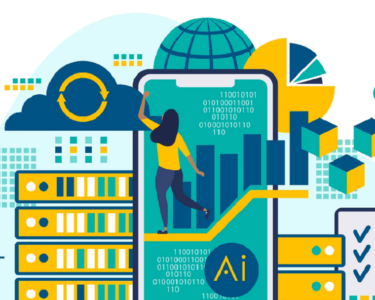We are living in an era where technology is the most unpredictable and variable thing. Artificial intelligence (AI) has been changing our lives for decades, but never has AI felt more universal than now.
What is AI (Artificial Intelligence)?
“Artificial Intelligence is the simulation of human intelligence processes by machines, especially computer systems. These processes include learning (the acquisition of information and rules for using the information), reasoning (using the rules to reach approximate or definite conclusions), and self-correction. “
Today the most common applications of AI are expert systems, speech recognition and machine vision.
The 5th generation of computer is the age of AI and it seems as though not a week passes without yet another AI system overcoming an exceptional hurdle or outperforming humans.
Must Read : How computer programming has changed over the course of the past 20 years
How AI has enabled gadgets, robots, apps and software to work more effectively
Things from homes to business have been totally changed with the invention of AI. Artificial Intelligent played a big role in effeminacy and effectiveness of gadgets and software as automation done a lot in making things easier.
Automation is the procedure of making a system or process function automatically or you can say robotically as Robotic process automation, for instance they can be programmed to execute high-volume, different repeatable tasks usually performed by humans.
RPA is also advancement in the field of AI and actually it is different from IT automation as it can adapt to changing circumstances.
To clarify more, If you had a system that can read all the pages and comprehend the situation instead of just throwing back 26 million pages to reply your question, that kind of program could truly answer the questions that you asked.
Just like if you asked a genuine and real time question and got a response from a person who had really read all those millions and billions of pages and understood them and been capable to combine all that information.
In a world where we all are sounded by gadgets, software and apps it is absolutely next Industrial Revolution (Industry 4.0) where the whole lot in machines and factories will be linked through sensors via IOT (Internet of Things) or WOT (Web of Things) platforms.
In all above situations AI will be used to analyzes circumstances in virtual worlds before they ever come about in the physical (mirroring) or can forecast when machines across your global factories will require servicing.
With the passage of time we will surely see a variety of steady, incremental developments in everyday AI. Online product recommendations will get better, voice recognition system will perk up as your phone or car system will recognize and understand your voice ever better and your vacuum cleaner robot won’t get stuck as habitually.
In upcoming days we’ll see some major advances ahead of today’s technology in several but not all of the following areas: healthcare, self-driving cars, utilities management (electricity, water etc), legal and service areas such as clean-up robots.
Apart from these applications, today’s AI algorithms have already support of amazingly precise machine sight, hearing, and speech, and they can access worldwide repositories of information.
With the help of deep learning and other advanced AI techniques performance continues to improve as we have witnessed a staggering level of growth in data, and ongoing advances in raw processing power.
These advancements have guided to an explosion in AI-enabled business applications, similar to the Cambrian era, when the evolution of eyesight contributed to an extraordinary worldwide boost in species diversity.
Entrepreneurs are setting their business more service oriented rather than product orient .In a matter of fact, lots of service organizations are starting to recognize the benefits of linking AI with robotic processing automation (RPA).

To add flexibility, intelligence, and learning via AI service oriented organizations are using rules-based software bots as substitute of human in desk activity and then adding. This approach connects the fast payback of RPA and the more advanced prospective of AI.
Over the next few years, we are looking forward AI to gain major traction in diagnosing illnesses. Visual AI agents previously outperform leading radiologists at diagnosing some particular forms of cancer, and many new startups and tech giants are adopting AI-enabled procedures to detect cancer even earlier and to offer ever more precise prognoses. AI can advance or replace some physician connections in the field of primary-care.
In the meantime, remote diagnostics can eradicate or radically decrease the number of patient visits to the hospital for some conditions. medtech companies will get benefit from it while possibly it may hurt biopharma companies and to some degree providers too, as improved, earlier diagnoses and methods of prevention decrease demand for treatment and cure.
Surely artificial intelligence will likely pick up the pace of the trend toward value-based health care in terms of the practice of paying for outcomes instead of volume.
What is the fuss about Mobile AI, how AI has boosted capabilities of smartphones cameras, processors and computing
Apart from robotics AI also revolutionized mobile industry as this year’s core smartphone launches Artificial Intelligence as a life-changing feature.
In the earlier generation of phones, AI was cloud-based and internet connection was compulsory to access them.
But today’s mobile phone features power voice assistant like Siri or the Google Assistant.
The new generation of smartphones will merge the cloud-based AI to built-in AI engines on the hardware. Many tech giants such as Google, Apple and Huawei as announced this advancement in their upcoming handsets.
Smartphones are using sparse processing to recognize images, voices and language and process them like data.
Phones like the Mate 10 will be competent to make decisions and optimize their performance based on what they have learnt from being used.
To integrate software system with hardware such as cameras, microphones and batteries in-device AI has played a major role.
AI will also enhance Google features such as live translations and Google Lens; the Google search we can activate by taking a picture through perceiving and understanding of language and images.
“AI is about better personalisation, performance and energy saving, we believe this is in the interest of everybody.
Smart apps or AI-infused apps are getting popular among users as they are handy and help to achieve daily tasks.
Mobile is the perfect platform for AI applications. Nowadays devices are offering many features to increase AI performance. Smartphones are equipped with GPS tracking, microphone and camera features.
Google revealed a new hands-free camera that will automatically take photos and video clips for users looking to grab their candid moments of with your family, friends and pet.
The small and square camera will rely on artificial intelligence called and named as Google Clips. To capture everything within its range of view it will be attached to a stationary object.
Moreover, recently Apple revealed the iPhone X, bursting with an A11 Bionic chip featuring a neural engine built for AI tasks such as Face ID’s 3D scanning.
In an era of personalization connecting AI technology with these built-in features makes apps more applicable and personalized.
I believe 20 years later will we will achieve the true goal of robotics and a thematic foundation of science action: a machine that can freely move with the intellectual capabilities of a human being and combination of rational plus logical thinking.




